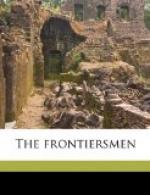“Oh, Lowannachen!” (Oh, north wind!) he moaned, holding up both hands outstretched to the north. “Oh, wischiksil! Witschemil!” (Oh, be thou vigilant! Help me!)
Then suddenly lowering his head, he sped like the wind itself through the town, along the river bank and into the sacred precincts of the “beloved square.” Ah! here he had stood this evening with what different hope and heart. Here in front of the eastern cabin he had sat beside the wily Tsiskwa of Citico, who might hardly make feeble shift to sway a reed, and yet with sharp sarcasms had stabbed him again and again to the very heart.
“Pihmtonheu! Oh, pihmtonheu!” (He has the crooked mouth! Oh, he has the crooked mouth!) Tscholens muttered between his set teeth as he crossed the open space and paused before the western “holy cabin.”
But for his rage, perhaps, but for his smarting wounds, Tscholens might have labored with some deterrent sense of sacrilege. But no! With one elastic bound he leaped upon the “holy white seat,” whence he surmounted the tier of places still behind and higher; then he lightly swung himself down into the intervening space in front of the inner partition formed by a red clay wall.
A momentary pause—a monition of caution. He looked back over his shoulder at the pallid world without, visible across the barrier of seats through the broad entrance of the loggia-like place. With the reflection from the drifts on the ground and the tempered radiance of the moon behind the tissues of cloud, the scene seemed more wan, more illumined with ghastly light, because of the density of the gloom wherein he stood. The conical-shaped winter tenements had each a thatch of snow; the great circular council-house, with its whitened dome, glimmered as stately as some marble rotunda, on its high mound, distinct against the blurring blue shadow of the night and the gray clouds and the bare boughs of the encompassing forest. No living creature was to be seen, save the dog that had followed him, and that had paused to investigate some real or fancied find beneath the snow,—a bone, perhaps, flung out from the feastings of overnight; perhaps some little animal, young or hurt, whelmed in the drift. Now the dog thrust down a tense, inquiring muzzle, sniffing tentatively, cautiously, and again he plied alternately his forefeet and his hindfeet, digging out the snow from the quarry; then once more, with a motionless body and a straight, quivering tail, he applied his sensitive nostrils to the examination.
Tscholens with gratification noted his absorption. This was indeed well. The animal’s persistent following further might have hampered his plans and revealed his intrusion. The next moment, as the illau turned to his purpose, densest night seemed to have encompassed him. The shadows cloaked all, save only the blank wall of clay and, down close to the ground, an arched opening into the sanctum




